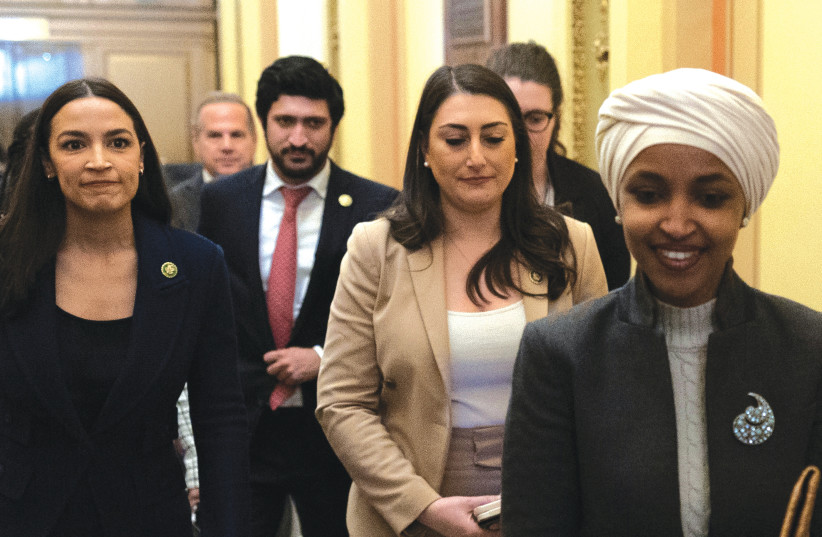New York Democratic Congresswoman Alexandria Ocasio-Cortez made clear that she and the women she was speaking with held opposing views on the United States’s role in the Israel-Hamas war, but that it was possible to hold space for discussion without excluding one another.
Stacy Burdett, former vice president for Government Relations, Advocacy and Community Engagement at the Anti-Defamation League and government and external relations director at the US Holocaust Memorial Museum, and Amy Spitalnick, CEO of the Jewish Council for Public Affairs, joined Ocasio-Cortez on Monday afternoon for a webinar on “Antisemitism and the Fight for Democracy,” when they spoke about antisemitism post-October 7 and coalition building in progressive spaces where Zionists are excluded.
“Antisemitism, hate, and violence against Jews because of their identity is real and it is dangerous. It is also important to say here in this moment, and during that conversation, that criticism of the Israeli government is not inherently antisemitic, and criticism of Zionism is not automatically antisemitic,” Ocasio-Cortez said at the beginning of the discussion.
Rising hate towards Jews
Right now, antisemitism is on the rise in America and across the world, she said.
“Acknowledging that fact does not take away from fights for liberation,” Ocasio-Cortez added. “It actually advances them. And the growth of antisemitic attacks and rhetoric, before and since October 7, is unacceptable to all of us who believe in a better world, period.”
Ocasio-Cortez criticized politicians who weaponize accusations of antisemitism against people, especially women of color in efforts to sow division and create a false choice between the fight for Jewish safety and the cause for Palestinian self-determination.

People can disagree bitterly about Israel and Gaza, Ocasio-Cortez said, but it feels like it’s impossible to come together to acknowledge any antisemitism at all.
“And because of that defensiveness, people shut down and other people’s identities get completely flattened,” she said. “That’s when all nuance goes out the window, and we all become less safe for it.”
Burdett explained the history of antisemitism, and supported Ocasio-Cortez’s claim that people use the power of labeling someone as antisemitic to hurt political opponents.
“There are bad actors using this issue as a weapon in this moment against progressives. It’s an issue that fits very neatly into a culture war narrative,” Burdett said. “And in that culture war, this big group of people determined to brand progressives and diversity itself as a threat.”
Spitalnick said the conspiracy theories behind antisemitism also intend to sow distrust in democracy, making Jews and every community unsafe as it undercuts democratic norms and values.
It’s seen in the Israel conversation how antisemitism is used to divide Jews from the communities and pro-democracy coalitions with which Jews need to be in solidarity, Spitalnick said.
Spitalnick reiterated Jews and all communities are unsafe if communities are pitted against one another and if the vast majority of American Jews are told they’re unwelcome in progressive spaces for having a connection to Israel or a relationship to Israel.
“We’ll never be able to come together to advance the sort of inclusive future we need,” Spitalnick said. “Ultimately, our safety is inextricably linked and bound up with one another’s and with our democracy.”
